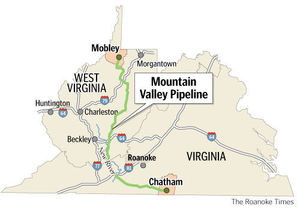Suddenly it seems to be raining natural gas pipelines and snowing millions of dollars in tax breaks and incentives for rich electric utilities.
Dominion Resources, the powerful and politically well-connected Richmond-based utility, apparently is getting $30 million in public money from the Virginia Tobacco Indemnification and Revitalization Commission without apparently asking for it to help build a new natural gas-fired generating plant in Brunswick County. The information was broken by the Associated Press.
Largesse for Dominion stretches to the other side of the Potomac River as well. The Washington Post reported Sunday that Calvert County Md., where Dominion has approval to convert a liquefied natural gas facility to handle natural gas exports, is going to give the utility about $560 million in tax credits.
And, back in Virginia, controversial is growing over the $5 billion natural pipeline that Virginia and three other southern utilities are planning to take natural gas drilled by hydraulic fracking methods from West Virginia to Virginia and North Carolina.
The Atlantic Coast Pipeline has drawn criticism from environmentalists who fear that gas is not the cleaner panacea to coal that many think. Landowners complain that Dominion and its powerful Richmond law firm, McGuireWoods, are using strong arm methods to force their way on their land to survey possible routes.
 Yet another pipeline – this one doesn’t involve Dominion – is drawing concern in southwestern Virginia. The $3.5 billion Mountain Valley Pipeline that would likewise begin in the fracked gaslands of northern West Virginia and head south west of Roanoke and then cut to the small town of Chatham.
Yet another pipeline – this one doesn’t involve Dominion – is drawing concern in southwestern Virginia. The $3.5 billion Mountain Valley Pipeline that would likewise begin in the fracked gaslands of northern West Virginia and head south west of Roanoke and then cut to the small town of Chatham.
The complaints are the same as the Atlantic Coast Pipeline – green concerns about leaking methane and the threat of bulldozing bucolic private land by companies using eminent domain.
The Mountain Valley project is being spearheaded by EQT Corp. of Pittsburgh and NextEra Energy of Florida.
So what gives? Utilities like Dominion are using more gas, namely at its new Brunswick County natural gas plant and at an older coal-fired station that’s been converted at Bremo Bluffs on the James River. But how much gas does it actually need?
In the case of Cove Point, Dominion notes that the plant has been importing LNG from places like Northern Africa and Scandinavia for decades although imports have come to a spot given the glut of cheap, domestic gas.
Dominion, which bought the facility about a decade ago, can get gas from an older pipeline that for years has linked the Chesapeake Bay area with gasfields in Pennsylvania where some of the fracking for new product is occurring. Dominion can also tap gas from the venerable Transco Pipeline that for decades has transported gas the traditional way – from the Gulf State processing stations to the northeast.
Dominion says it already has contracts to export gas – from where it comes domestically – to utilities in Japan and India. But when one looks at the spaghetti-like twirl of all of the proposed new pipelines, one wonders what the game really is.
The Atlantic Coast Pipeline has a leg that bounds over to Hampton Roads from near the North Carolina border. Dominion says that this one will help supply one of its pipeline partners with gas because it serves South Hampton Roads. Ok, fine, but it might also serve another new LNG export facility in that area that has perfect deep water conditions for such a facility.
And, as some environmentalists and property owners wonder, why couldn’t the energy companies tap rights of way near existing pipelines? Why can’t existing pipelines be expanded? Go back to the utilities and they say they don’t know exactly where the pipelines will go.
That is very curious. While they don’t know where mega-billion project projects are going to go, they seem to be getting tens, if not hundreds, of billions of dollars in public funds and tax breaks to help them proceed with the Brave New World of natural gas.



